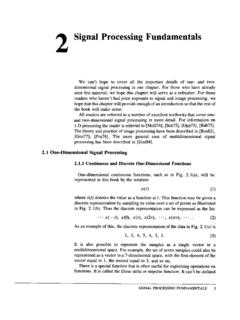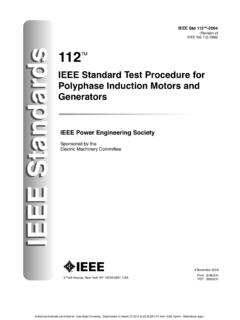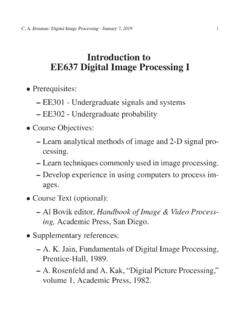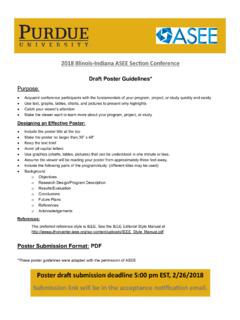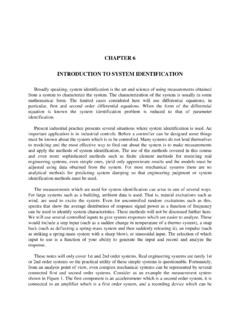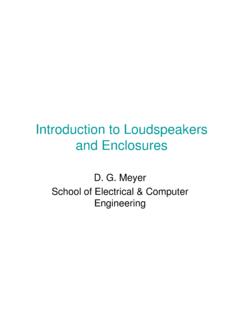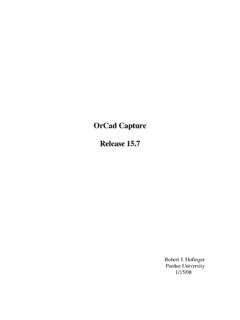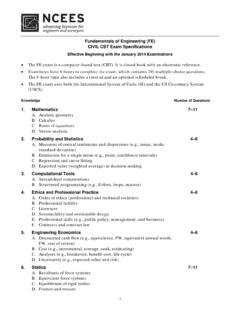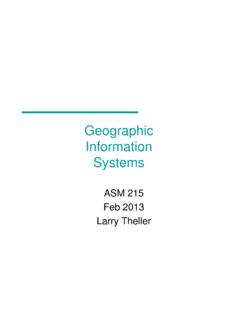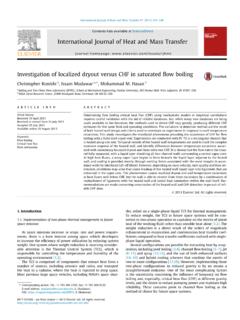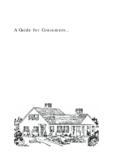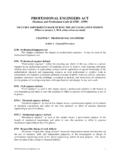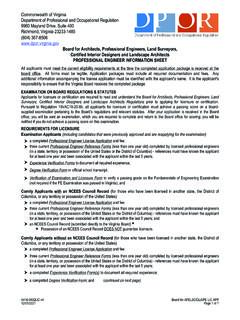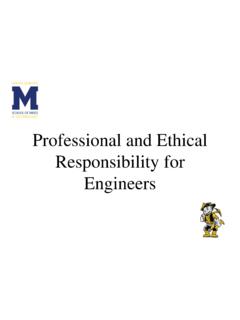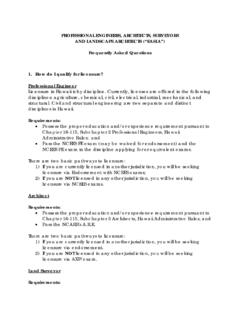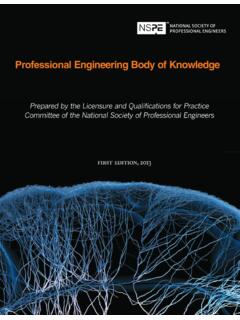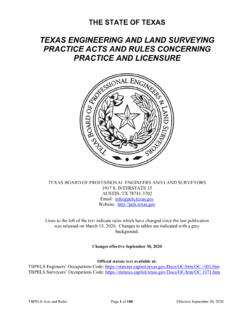Transcription of CODE OF ETHICS OF ENGINEERS - College of Engineering
1 CODE OF ETHICS OF ENGINEERS THE FUNDAMENTAL PRINCIPLES ENGINEERS uphold and advance the integrity, honor and dignity of the Engineering profession by: I. using their knowledge and skill for the enhancement of human welfare; II. being honest and impartial, and servicing with fidelity the public, their employers and clients; III. striving to increase the competence and prestige of the Engineering profession; and IV. supporting the professional and technical societies of their disciplines. THE FUNDAMENTAL CANONS 1. ENGINEERS shall hold paramount the safety, health and welfare of the public in the performance of their professional duties. 2. ENGINEERS shall perform services only in the areas of their competence. 3. ENGINEERS shall issue public statements only in an objective and truthful manner. 4. ENGINEERS shall act in professional maters for each employer or client as faithful agents or trustees, and shall avoid conflicts of interest.
2 5. ENGINEERS shall build their professional reputation on the merit of their services and shall not compete unfairly with others. 6. ENGINEERS shall act in such a manner as to uphold and enhance the honor, integrity and dignity of the profession. 7. ENGINEERS shall continue their professional development throughout their careers and shall provide opportunities for the professional development of those ENGINEERS under their supervision. Approved by the Board of Directors, October 5, 1977 Suggested Guidelines for use with The Fundamental Canons of ETHICS 2 SUGGESTED GUIDELINES FOR USE WITH THE FUNDAMENTAL CANONS OF ETHICS 1. ENGINEERS shall hold paramount the safety, health and welfare of the public in the performance of their professional duties. a. ENGINEERS shall recognize that the lives, safety, health and welfare of the general public are dependent upon Engineering judgments, decisions and practices incorporated into structures, machines, products, processes and devices.
3 B. ENGINEERS shall not approve nor seal plans and/or specifications that do not conform with accepted Engineering standards and are not design safe, as it would endanger public health and welfare. c. Should the ENGINEERS professional judgment be overruled under circumstances where the safety, health, and welfare of the public are endangered, the ENGINEERS shall inform their clients or employers of the possible consequences and notify other proper authority of the situation, as may be appropriate. ( ) ENGINEERS shall do whatever possible to provide published standards, test codes and quality control procedures that will enable the public to understand the degree of safety or life expectance associated with the use of the design, products and systems for which they are responsible. ( ) ENGINEERS will conduct reviews of the safety and reliability of the design, products or systems for which they are responsible before giving their approval to the plans for the design.
4 ( ) Should ENGINEERS observe conditions, which they believe, will endanger public safety or health, they shall inform the proper authority of the situation. d. Should ENGINEERS have knowledge or reason to believe that another person or firm may be in violation of any of the provisions of the Guidelines, they shall present such information to the proper authority in writing and shall cooperate with the proper authority in furnishing such further information or assistance as may be required. ( ) They shall advise proper authority if an adequate review of the safety and reliability of the products or systems has not been made or when the design imposes hazards to the public through its use. ( ) They shall withhold approval of products of systems when changes or modifications are made which would adversely affect its performance insofar as safety and reliability are concerned. e. ENGINEERS should seek opportunities to be of constructive service in civic affairs and work for the advancement of the safety, health and well being of their communities.
5 F. ENGINEERS should be committed to improving the environment to enhance the quality of life. 2. ENGINEERS shall perform services only in areas of their competence. a. ENGINEERS shall undertake to perform Engineering assignments only when qualified by education or experience in the specific technical field of Engineering involved. b. ENGINEERS may accept an assignment requiring education or experience outside of their own fields of competence, but only to the extent that their services are restricted to those phases of the project in which they are qualified. All other phases of such project shall be performed by qualified associates, consultants, or employees. c. ENGINEERS shall not affix their signatures and/or seals to any Engineering plan or document dealing with subject matter in which they lack competence by virtue of education or experience, nor to any such plan or document not prepared under their direct supervisory control.
6 3. ENGINEERS shall issue public statements only in an objective and truthful manner. a. ENGINEERS shall endeavor to extend public knowledge, and to prevent misunderstandings of the achievements of Engineering . b. ENGINEERS shall be completely objective and truthful in all professional reports, statements, or testimony. They shall include all relevant and pertinent information in such reports, statements, or testimony. c. ENGINEERS , when serving as expert or technical witnesses before any court, commission, or other tribunal, shall express an Engineering opinion only when it is founded upon adequate knowledge of the facts in issue, upon a background of technical competence in the subject matter, and upon honest conviction of the accuracy and propriety of their testimony. d. ENGINEERS shall issue no statements, criticisms, nor arguments on Engineering matters which are inspired or paid for by an interested party, or parties, unless they have prefaced their comments by explicitly identifying themselves, by disclosing the identities of the party or parties on whose behalf they are speaking, and by revealing the existence of any pecuniary interest they may have in the instant matters.
7 E. ENGINEERS shall be dignified and modest in explaining their work and merit, and will avoid any act tending to promote their own interests at the expense of the integrity, honor and dignity of the profession. 4. ENGINEERS shall act in professional matters for each employer or client as faithful agents or trustees, and shall avoid conflicts of interest. a. ENGINEERS shall avoid all known conflicts of interest with their employers or clients of any business association, interests, or circumstances, which could influence their judgment or the quality of their services. b. ENGINEERS shall not knowingly undertake any assignments, which would knowingly create a potential conflict of interest between themselves and their clients or their employees. c. ENGINEERS shall not accept compensation, financial or otherwise, from more than one party for services on the same project, nor for services pertaining to the same project, unless the circumstances are fully disclosed to, and agreed to, by all interested parties.
8 D. ENGINEERS shall not solicit nor accept financial or other valuable considerations, including free Engineering designs, from material or equipment suppliers for specifying their products. e. ENGINEERS shall not solicit nor accept gratuities, directly or indirectly, from contractors, their agents, or Suggested Guidelines for use with The Fundamental Canons of ETHICS 3 other parties dealing with their clients or employers in connection with work for which they are responsible. f. When in public service as members, advisors, or employees of a governmental body or department, ENGINEERS shall not participate in considerations or actions with respect to services provided by them or their organization in private or product Engineering practice. g. ENGINEERS shall not solicit nor accept an Engineering contract from a governmental body on which a principal, officer of employee of their organization serves as a member.
9 H. When, as a result of their studies, ENGINEERS believe a project will not be successful, they shall so advise their employer or client. i. ENGINEERS shall treat information coming to them in the course of their assignments as confidential, and shall not use such information as a means of making personal profit if such action is adverse to the interests of their clients, their employers, or the public. ( ) They will not disclose confidential information concerning the business affairs of technical processes of any present or former employer or client or bidder under evaluation, without his consent. ( ) They shall not reveal confidential information or findings of any commission or board of which they are members. ( ) They shall not duplicate designs supplied by clients for others without permission from the client. ( ) While in the employ of others, ENGINEERS will not enter promotional efforts or negotiations for work or make arrangements for other employment as principals or to practice in connection with specific projects for which they have gained particular and specialized knowledge without the consent of all interested parties.
10 J. The engineer shall act with fairness and justice to all parties when administering a construction (or other) contract. k. Before undertaking work for others in which ENGINEERS may make improvements, plans, designs, inventions, or other records which may justify copyrights or patents, they shall enter into a positive agreement regarding ownership. l. ENGINEERS shall admit and accept their own errors when proven wrong and refrain from distorting or altering the fact(s) to justify their decisions. m. ENGINEERS shall not accept professional employment outside of their regular work or interest without the knowledge of their employers. n. ENGINEERS shall not attempt to attract an employee from another employer by false or misleading representations. o. ENGINEERS shall not review the work of other ENGINEERS except with the knowledge of such ENGINEERS , or unless the assignments or contractual agreements for the work have been terminated.
